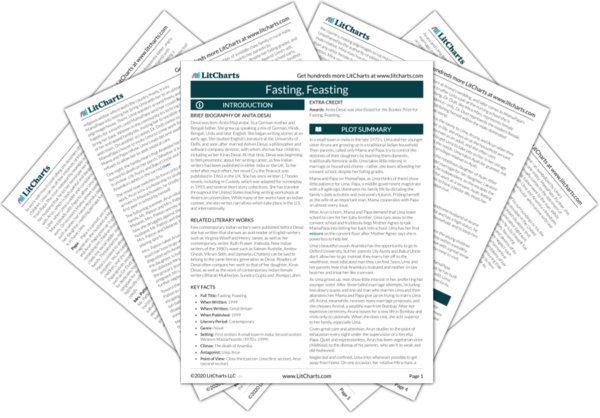Papa Quotes in Fasting, Feasting
MamaandPapa. MamaPapa. PapaMama. It was hard to believe they had ever been separate existences, that they had been separate entities and not MamaPapa in one breath.
One could be forgiven for thinking Papa’s chosen role was scowling, Mama’s scolding. Since every adult had to have a role, and these were their parents’, the children did not question their choices. At least, not during their childhoods.
No doors were ever shut in that household: closed doors meant secrets, nasty secrets, impermissible. It meant authority would come stalking in and make a search to seize upon the nastiness, the unclean blot.
Mama was frantic to have it terminated. She had never been more ill (…) but Papa set his jaws. They had two daughters, yes, quite grown-up as anyone could see, but there was no son. Would any man give up the chance of a son?
More than ever now, she was Papa’s helpmeet, his consort. He had not only made her his wife, he had made her the mother of his son (…) Was this love? Uma wondered disgustedly, was this romance? Then she sighed, knowing such concepts had never occurred to Mama: she did not read, she did not go to the cinema.
She sloshes some milk into the coffee. ‘Rosebuds. Wild Waltz. Passionately,’ she screams at them silently. She tosses in the sugar. ‘Madly. Vows. Fulfill,’ her silence roars at them. She clatters a spoon around the cup, spilling some milk into the saucer, and thrusts it at Papa. ‘Here,’ her eyes flash through her spectacles, ‘this, this is what I know. And you, you don’t.’
When she finally brought herself to tell him that Arun was a vegetarian and she herself had decided to give it a try (…) he reacted by not reacting, as if he had simply not heard, or understood. That, too was something Arun knew and had experience of (…)—his father’s very expression, walking off, denying any opposition, any challenge to his authority…

Papa Quotes in Fasting, Feasting
MamaandPapa. MamaPapa. PapaMama. It was hard to believe they had ever been separate existences, that they had been separate entities and not MamaPapa in one breath.
One could be forgiven for thinking Papa’s chosen role was scowling, Mama’s scolding. Since every adult had to have a role, and these were their parents’, the children did not question their choices. At least, not during their childhoods.
No doors were ever shut in that household: closed doors meant secrets, nasty secrets, impermissible. It meant authority would come stalking in and make a search to seize upon the nastiness, the unclean blot.
Mama was frantic to have it terminated. She had never been more ill (…) but Papa set his jaws. They had two daughters, yes, quite grown-up as anyone could see, but there was no son. Would any man give up the chance of a son?
More than ever now, she was Papa’s helpmeet, his consort. He had not only made her his wife, he had made her the mother of his son (…) Was this love? Uma wondered disgustedly, was this romance? Then she sighed, knowing such concepts had never occurred to Mama: she did not read, she did not go to the cinema.
She sloshes some milk into the coffee. ‘Rosebuds. Wild Waltz. Passionately,’ she screams at them silently. She tosses in the sugar. ‘Madly. Vows. Fulfill,’ her silence roars at them. She clatters a spoon around the cup, spilling some milk into the saucer, and thrusts it at Papa. ‘Here,’ her eyes flash through her spectacles, ‘this, this is what I know. And you, you don’t.’
When she finally brought herself to tell him that Arun was a vegetarian and she herself had decided to give it a try (…) he reacted by not reacting, as if he had simply not heard, or understood. That, too was something Arun knew and had experience of (…)—his father’s very expression, walking off, denying any opposition, any challenge to his authority…











